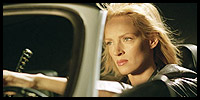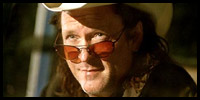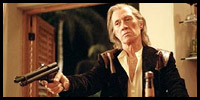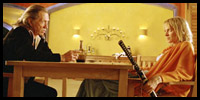
 |
|
Kill Bill: Volume Two (2004) Cast: Uma Thurman, David Carradine, Michael Madsen, Daryl Hannah, Gordon Liu, Michael Parks, Perla Haney-Jardine, Chris Nelson, Bo Svenson, Sid Haig, Caitlin Keats, Samuel L. Jackson 2004 – 130 minutes Rated: Reviewed by Dustin Putman, April 17, 2004.  In my October 2003 review of "Kill Bill: Volume One," I praised the film as an invigoratingly original, exciting, beautiful, poetic ode to the martial-arts/spaghetti western genres, while at the same time criticized it for being only half of a movie. Unlike any part of "The Lord of the Rings" trilogy, for example, which all had definitive beginnings and ends as they fit within a greater tapestry, "Kill Bill" was written and filmed as a single epic. And what an epic it would have been. Unfortunately, mistrusting that audiences would not be able to sit through a 3 1/2-hour opus, Miramax (and, allegedly, Tarantino) made the dismal decision to chop the story right down the middle and release it as two separate features. A greedy proposition? Condescending of audiences, particularly Quentin Tarantino fans? A big mistake that makes both halves less satisfying than they would have been as one entity? Yes, yes, and yes.
In my October 2003 review of "Kill Bill: Volume One," I praised the film as an invigoratingly original, exciting, beautiful, poetic ode to the martial-arts/spaghetti western genres, while at the same time criticized it for being only half of a movie. Unlike any part of "The Lord of the Rings" trilogy, for example, which all had definitive beginnings and ends as they fit within a greater tapestry, "Kill Bill" was written and filmed as a single epic. And what an epic it would have been. Unfortunately, mistrusting that audiences would not be able to sit through a 3 1/2-hour opus, Miramax (and, allegedly, Tarantino) made the dismal decision to chop the story right down the middle and release it as two separate features. A greedy proposition? Condescending of audiences, particularly Quentin Tarantino fans? A big mistake that makes both halves less satisfying than they would have been as one entity? Yes, yes, and yes.
 Imagining "Kill Bill: Volume One" and "Kill Bill: Volume Two" as a single, flowing narrative, the result would likely be one of astounding ambition, sweeping scope, and sharp emotional depth—an undoubted modern masterpiece. Even on its own, "Volume One" nearly achieved that feat, a motion picture that might have lacked a conclusion but could, more or less, be viewed as merely the setup for an already-in-the-can sequel. In its every technical credit, its every incendiary music cue, its every line of dialogue, its every elaborately violent action setpiece, and its every performance, "Volume One" was alive and kicking in a way very few films are nowadays. Woefully, "Volume Two" just doesn't hold the same impact on its own and, as a film that starts in midstream, it is even less satisfying as an individual film than "Volume One" was.
Imagining "Kill Bill: Volume One" and "Kill Bill: Volume Two" as a single, flowing narrative, the result would likely be one of astounding ambition, sweeping scope, and sharp emotional depth—an undoubted modern masterpiece. Even on its own, "Volume One" nearly achieved that feat, a motion picture that might have lacked a conclusion but could, more or less, be viewed as merely the setup for an already-in-the-can sequel. In its every technical credit, its every incendiary music cue, its every line of dialogue, its every elaborately violent action setpiece, and its every performance, "Volume One" was alive and kicking in a way very few films are nowadays. Woefully, "Volume Two" just doesn't hold the same impact on its own and, as a film that starts in midstream, it is even less satisfying as an individual film than "Volume One" was.
 In pacing and tone, "Kill Bill: Volume Two" differs greatly from its predecessor. "Volume One" was like a delicious appetizer that came fast and furiously, never stopping to catch its breath and downright intoxicating in its joy, energy, and inspiration. The film mixed live-action, black-and-white, split-screen effects, an anime sequence, geysers of blood, an applause-worthy single-shot sequence, swooping cinematography, cool musical montages, and colorful, stylized art direction, all in the name of capturing a look and feel to call its own. In comparison, "Volume Two" is slow-paced, dialogue-heavy, filled with exposition, and, save for a showstopping fight to the death in a motor home, virtually actionless. And while there are a few stylistic choices that carry over from film to film—and a new effective one of its own as a scene takes place in complete darkness—the art direction and cinematography are more commonplace, the music score and song choices are less notable, and there are several dry, drug-out patches.
In pacing and tone, "Kill Bill: Volume Two" differs greatly from its predecessor. "Volume One" was like a delicious appetizer that came fast and furiously, never stopping to catch its breath and downright intoxicating in its joy, energy, and inspiration. The film mixed live-action, black-and-white, split-screen effects, an anime sequence, geysers of blood, an applause-worthy single-shot sequence, swooping cinematography, cool musical montages, and colorful, stylized art direction, all in the name of capturing a look and feel to call its own. In comparison, "Volume Two" is slow-paced, dialogue-heavy, filled with exposition, and, save for a showstopping fight to the death in a motor home, virtually actionless. And while there are a few stylistic choices that carry over from film to film—and a new effective one of its own as a scene takes place in complete darkness—the art direction and cinematography are more commonplace, the music score and song choices are less notable, and there are several dry, drug-out patches.
 When "The Bride" (Uma Thurman) was last seen in "Volume One," she had successfully slaughtered two of her enemies—O-Ren Ishii/"Cottonmouth" (Lucy Liu) and Vernita Green/"Copperhead" (Vivica A. Fox)—and had three more to go. An ex-assassin who was brutally shot and left for dead during her wedding rehearsal, "The Bride" had awoken from her coma four-and-a-half years later, vowing to seek revenge on her old Assassination Squad. Next on her list: Budd/"Sidewinder" (Michael Madsen), Elle Driver/"California Mountain Snake" (Daryl Hannah), and leader of the pack, Bill (David Carradine), whom "The Bride" once was in love with. Meanwhile, "The Bride" moves closer and closer to the daughter she has no idea survived.
When "The Bride" (Uma Thurman) was last seen in "Volume One," she had successfully slaughtered two of her enemies—O-Ren Ishii/"Cottonmouth" (Lucy Liu) and Vernita Green/"Copperhead" (Vivica A. Fox)—and had three more to go. An ex-assassin who was brutally shot and left for dead during her wedding rehearsal, "The Bride" had awoken from her coma four-and-a-half years later, vowing to seek revenge on her old Assassination Squad. Next on her list: Budd/"Sidewinder" (Michael Madsen), Elle Driver/"California Mountain Snake" (Daryl Hannah), and leader of the pack, Bill (David Carradine), whom "The Bride" once was in love with. Meanwhile, "The Bride" moves closer and closer to the daughter she has no idea survived.
 Whereas there wasn't a wasted moment in all 108 minutes of "Volume One," the 130-minute "Kill Bill: Volume Two" could have been cut by at least thirty minutes without any footage being missed. Some scenes, such as one set at the nightclub Budd works at and another in which "The Bride" meets with an acquaintance of Bill's to find out his whereabouts, are extraneous bits of egocentrism on Tarantino's part. They are there to show off his dialogue, while glaringly calling attention to themselves because they do not add to the larger story. For a peculiarly long period of time, "The Bride," whose story we are supposed to be following, is nowhere to be found as the film goes off on unfocused tangents.
Whereas there wasn't a wasted moment in all 108 minutes of "Volume One," the 130-minute "Kill Bill: Volume Two" could have been cut by at least thirty minutes without any footage being missed. Some scenes, such as one set at the nightclub Budd works at and another in which "The Bride" meets with an acquaintance of Bill's to find out his whereabouts, are extraneous bits of egocentrism on Tarantino's part. They are there to show off his dialogue, while glaringly calling attention to themselves because they do not add to the larger story. For a peculiarly long period of time, "The Bride," whose story we are supposed to be following, is nowhere to be found as the film goes off on unfocused tangents.
 Odd, too, that Tarantino dedicated nearly ten minutes of screen time to O-Ren Ishii's fascinating backstory in "Volume One," yet fails to endow the rest of "The Bride"'s targets the same depth and care. When Budd and Elle are inevitably killed, it is little more than a means to her goal, and has none of the weight afforded Ishii's death. Also missing in action is any development concerning the relationship dynamic of the Assassination Squad pre-church massacre. Even the list "The Bride" made in "Volume One" as she marked off her successful hits is nowhere to be found. Instead of satiating his own love affair with his words in overlong subplots, Quentin Tarantino would have been wise to fill in the obvious plot gaps and questions that viewers might naturally want to see answered.
Odd, too, that Tarantino dedicated nearly ten minutes of screen time to O-Ren Ishii's fascinating backstory in "Volume One," yet fails to endow the rest of "The Bride"'s targets the same depth and care. When Budd and Elle are inevitably killed, it is little more than a means to her goal, and has none of the weight afforded Ishii's death. Also missing in action is any development concerning the relationship dynamic of the Assassination Squad pre-church massacre. Even the list "The Bride" made in "Volume One" as she marked off her successful hits is nowhere to be found. Instead of satiating his own love affair with his words in overlong subplots, Quentin Tarantino would have been wise to fill in the obvious plot gaps and questions that viewers might naturally want to see answered.
 All of that said, "Kill Bill: Volume Two" does have its high points. The brutal training "The Bride" receives from Pai Mai (Gordon Liu) is brought to vibrant, funny fruition in a segment that is just right in its length. All of the scenes with the venomous Elle Driver are superb, including the acidly funny confrontation she shares with Budd and followed by the explosive, unrelenting catfight between she and "The Bride" in Budd's motor home. Daryl Hannah (2003's "Casa de los Babys") has never been better, or more wickedly hateful, as she is in the vivid, eyepatch-wearing role of Elle Driver. Also affecting are some surprisingly tender moments between "The Bride" and Bill, who share something of a tragic love story, and a quietly lovely late scene in which "The Bride" puts her just-reunited daughter to bed for the first time.
All of that said, "Kill Bill: Volume Two" does have its high points. The brutal training "The Bride" receives from Pai Mai (Gordon Liu) is brought to vibrant, funny fruition in a segment that is just right in its length. All of the scenes with the venomous Elle Driver are superb, including the acidly funny confrontation she shares with Budd and followed by the explosive, unrelenting catfight between she and "The Bride" in Budd's motor home. Daryl Hannah (2003's "Casa de los Babys") has never been better, or more wickedly hateful, as she is in the vivid, eyepatch-wearing role of Elle Driver. Also affecting are some surprisingly tender moments between "The Bride" and Bill, who share something of a tragic love story, and a quietly lovely late scene in which "The Bride" puts her just-reunited daughter to bed for the first time.
 Uma Thurman (2003's "Paycheck") is as much of a standout here as she was in "Volume One." It is Thurman who carries the entire film on her back, and she is perfect in the kind of strong-willed, tough yet vulnerable role she was seemingly born to play. Meanwhile, as the unforgettable title character, underrated veteran actor David Carradine deserves Oscar consideration for what is, indeed, a career-revitalizing role.
Uma Thurman (2003's "Paycheck") is as much of a standout here as she was in "Volume One." It is Thurman who carries the entire film on her back, and she is perfect in the kind of strong-willed, tough yet vulnerable role she was seemingly born to play. Meanwhile, as the unforgettable title character, underrated veteran actor David Carradine deserves Oscar consideration for what is, indeed, a career-revitalizing role.
 "Kill Bill: Volume Two" is a fine film in many respects, assured and richly textured and faultlessly shot as a master of writer-director Quentin Tarantino's caliber could only achieve. On its own, however, it is regrettably disappointing, a missed opportunity and a marginally unfocused feature. So congratulations, Quentin Tarantino and Miramax. With "Kill Bill," you single-handedly turned a brilliant motion picture into two lesser one's. Worst of all, such a calamitous downfall could have been avoided with more faith in viewers and less emphasis on the almighty dollar. The impending DVD, in which both volumes are finally joined together as they should have been from the get-go, cannot arrive soon enough.
"Kill Bill: Volume Two" is a fine film in many respects, assured and richly textured and faultlessly shot as a master of writer-director Quentin Tarantino's caliber could only achieve. On its own, however, it is regrettably disappointing, a missed opportunity and a marginally unfocused feature. So congratulations, Quentin Tarantino and Miramax. With "Kill Bill," you single-handedly turned a brilliant motion picture into two lesser one's. Worst of all, such a calamitous downfall could have been avoided with more faith in viewers and less emphasis on the almighty dollar. The impending DVD, in which both volumes are finally joined together as they should have been from the get-go, cannot arrive soon enough.
|
© 2004 by Dustin Putman |














